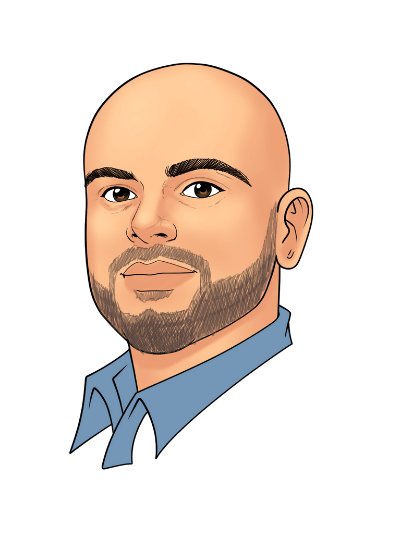
95
Episode 95 47 mins
When You Mess Up, Fess Up: Why Self-Awareness Is a Leadership Superpower
Heidi Hauver, Vice President, People Experience at Shinydocs
00:00
00:00

The next time you mess up and fess up, you will have more trust and credibility with your team. I encourage leaders to start now because for me, once I started acknowledging that I don't need to be the smartest person in the room, I need to be the person that's gonna cultivate a great environment, bring the right people together, and fill the gaps. I don't need to have all the answers.
In this episode
How often do you stand up and say, “Oops, I messed up.”?
The next time you mess up and fess up, you will have more trust and credibility with your team.
Heidi Hauver, Vice President, People Experience at ShinyDocs, reminds us that you don’t need to be the smartest person in the room. You need to cultivate a great environment and bring the right people together.
On episode 95, Heidi shares why self-awareness is a leadership superpower and the best ways leaders should be giving and getting feedback.
We also talked about the similarities between leadership and parenting, and the different lessons she learned that everyone can apply to their teams.
Lastly, we covered having a growth mindset in both children and adults, and the practice of active listening.
Tune in to hear all about Heidi’s leadership journey and the lessons learned along the way!
Like this episode? Be sure to leave a ⭐️⭐️⭐️⭐️⭐️ review and share the podcast with your colleagues.
06:16
Self-awareness is a superpower
08:22
Giving and getting constructive feedback
15:14
Applying curiosity
18:06
Leadership and parenting
27:09
Don’t jump to solve problems
30:50
Adding ‘yet’ for a growth mindset
34:30
Mess up, fess up
40:20
Acknowledging individual needs
Resources
- Follow Heidi here
- Listen to our episode with Scott Williamson, CPO of Gitlab
- Listen to our episode with Michael Bungay Stanier, author of The Coaching Habit
- Read UnSelfie: Why Empathetic Kids Succeed in Our All-About-Me World
- Read Lean In
- Read Beautiful Oops!
Transcript
Aydin Mirzaee (Fellow.app) 00:31
Welcome to the show.
Heidi Hauver (Shinydocs) 03:26
Great to see you and or hear from you again, and great to be here.
Aydin Mirzaee (Fellow.app) 03:31
Yeah, it’s great to have you here. Obviously, you and I have known each other for quite a while. But you’ve also had a pretty sensitive leadership career worked at a bunch of really cool places. You know, you’ve been at a bunch of startups like Pythian. And today you just joined a new company as VP of people experience. It’s called shiny docs. Congratulations on the new role.
Heidi Hauver (Shinydocs) 03:52
Thank you very much.
Aydin Mirzaee (Fellow.app) 03:53
Yeah. So and I guess like one of the things I mean, obviously, there’s a lot of topics we’re going to talk about today. And I’m very excited to dig in. But one of the questions that we really like to ask our guests when they first come on the show, is if you were to rewind back to the early days of when you first started to manage people manage a team? What were some of the early mistakes that you made back then
Heidi Hauver (Shinydocs) 04:15
I could do a whole episode on just those mistakes. So many things I think about, you know, I tried really hard. I think a lot of us as new managers, we tried to put our best foot forward and we sort of overdo it sometimes, you know, there’s probably a lot of micromanaging that happened early days, I would say definitely avoided some of the tougher discussions I should have been having because they were difficult. I would say as well. You know, just when building out my team, often I think as leaders we go to looking for folks that have similar backgrounds like us that are similar to us. And I think today I would do that very differently. Now I look for folks that are going to compliment me you know, fill in my gaps and I think that that’s something that you just learn as you start leading, and you start learning that you’re obviously much stronger as a team, when you’re you’ve got a lot of different skills and experiences at the table. And I would say to, you know, that recognition and and an early, early, early leader, that recognition that you know, your team is not necessarily your friends. And I think, you know, again, going back to trying really hard to make everybody happy, and making sure that, you know, you’re finding, you know, what is your role? What is your team’s role, setting clear expectations for success? Those are some of the things that I do today. But I didn’t necessarily do when I first started out,
Aydin Mirzaee (Fellow.app) 05:39
it makes a lot of sense. And I really liked the way you put it, which is that you start to look for people that fill in, like the gaps that you may have. Maybe let’s talk about that a little bit more. How did you first realize that that’s a way that you should operate? Like, how did you end up learning that lesson? Because I think like, this is a thing that is generally hard to learn. And I think, you know, a lot of us say, oh, we should have diverse teams. And, you know, this is a thing, like it’s a talking point, and people talk about it. But I like the way that you describe it, which is like filling in my gaps. So I want to Yeah, just figure out like, how did you come to that conclusion?
Heidi Hauver (Shinydocs) 06:16
I mean, I think over time, like everything, you know, that recognition, I probably had a couple of aha moments over the years of recognizing the biggest, I think lesson for any leader is that recognition that you don’t need to have all the answers, you don’t have all the answers. And that self awareness is a superpower. And so once I sort of honed my own self awareness, and you know, what am I strong in, you know, what are the things that I’m not strong in, and then going in trying to build out a team that was going to meet the needs of the organization that I was serving, I’m recognizing that, you know, I have gaps, and I should be filling in those gaps, as opposed to just bringing more people that have the same experience that education is missing background. And so that’s why I use, you know, fill in the gaps. And I just even was speaking to someone yesterday, a new leader. And I said to them, I bet you’re gonna go try to find someone with your exact background. You know, we’re on a video call, and they kind of gave me the eye and I said, You know what, think about the things maybe you’re not that excited about that, maybe you’re not that strong in and try to go and find someone that’s going to be complementary to you, because you’ll be much stronger as a leader, when you have those complementary skills on your team. And that’s served me really well.
Aydin Mirzaee (Fellow.app) 07:29
This is a very interesting point. And I have certainly heard my fair share of people saying that, if I could only clone myself, like, you know, that is just like the wrong way to think about it. And yeah, when you think about like the purpose of a team, being that you’re supposed to fill each other’s weaknesses, and not necessarily duplicate the strengths. It’s very interesting. The other thing that you said, though, was, you know, your team is not your, you can be friendly with your team. But it’s a very different, like, at the end of the day, like there is a difference between when you’re in a work environment, and you’re not, I guess, like, this is the thing that maybe comes up, if you are trying to find someone that is maybe different than you, you might want to find someone that has a similar background, because you might end up liking that person more. But at the end of the day, it’s not about making friends, right?
Heidi Hauver (Shinydocs) 08:22
Well, I think it’s because, you know, listen, a lot of my teams in the past, I consider them friends today, right? But in the moment, you got to realize that you have to have tough discussions, you have to make tough choices sometimes. And when you know, you obviously care about your team, and you want to cultivate that environment where they feel safe. There’s sometimes a fine line where you still have to have the tough discussion, you still have to make the tough decision. And I think that you know, again, early early days, as a leader, I think a lot of us do this, we try really, really hard to be the leader that that person wants us to be. We’re not authentic to ourselves. And then we struggle. And I think that again, you know, I’ve talked to a lot of leaders who early days say, No, I tried to be my employees or my team’s friends. And then that backfired, because when I had to give constructive feedback on their performance, I didn’t I avoided it much longer than I should have. And I think that’s pretty common. You know, when you care about someone, I think a lot of people struggle to give the tough feedback. Again, later in my leadership career, I think we have a sense of ownership. We are responsible for our team’s success. And we’re not helping them. We’re not doing them any favors, if we actually don’t set clear expectations and help them define success. So I encourage all leaders out there to think about that, you know, if you’re avoiding that conversation with someone that you’re working with, because it’s tough, it’s not a good enough excuse. You’re actually not helping them be successful long term. By having that conversation. I mean, there’s a ton of things that you can do to get ready for that. You’ll get to know obviously, about that person. One of the favorite questions I have when I first start working with somebody is no aid and at some point, I’m going to have to give you feedback. This is how I like to get feedback. How do you like to get feedback, if you can set that clarity right from the very beginning, when I have to give you feedback, I’m going to mirror what you said to me six months earlier. And it can be a really helpful tool and, and it’s a tip that I often give new leaders that that can be really helpful.
Aydin Mirzaee (Fellow.app) 10:21
And what are the different ways like when you ask that question, what kind of responses you typically get?
Heidi Hauver (Shinydocs) 10:27
A lot of the times people say, tell me right away. And so I’ll say to them, Okay, that’s fair. But let’s say and then I will actually ask more questions. And I’ll be more curious, because a lot of times people give us that first surface level answer. And we need to dig a little bit deeper. So if you said to me, so let me ask you the question, Aydin, how do you like to get feedback?
Aydin Mirzaee (Fellow.app) 10:47
I’m gonna say, tell me right away.
Heidi Hauver (Shinydocs) 10:49
Exactly. Okay, you didn’t fair enough. But if I told you right away, are you gonna have enough time to think about that? How can I follow up with you? So let’s say I told you feedback right away? Is there a way that I could follow up with you maybe in an email, or maybe we could connect a couple days later. So we can explore that topic a bit further. So I would maybe take your sort of first level sort of answer, but then I would add to it, because I think a lot of times, people immediately want tell me in the moment. As you know, as a leader, it’s not always appropriate to share feedback right in the moment. And it’s best to kind of wait a day or two, and then share the feedback. So you can have a more expansive conversation. And it also gives you time to kind of formulate a plan on how you want to share that feedback. And I believe follow up is really important. So if you happen to share the feedback right away, make sure you check in with your team member later to see how they’re doing. And also to see that feedback loop. Right. Did the feedback resonate? Do they have additional questions for you? I think that that is really important and often miss giving feedback, and then not following up to find out if the person has any additional questions. And or if they need your help to formulate a plan on what to do with that feedback. It’s a missed opportunity.
Aydin Mirzaee (Fellow.app) 12:04
Now that you asked a question that way, I think, you know, if I were to answer that, I would say I heard this term recently, we just had the Chief Product Officer at GitLab was on our on our podcast. And so he had this term, which I really liked, which he called the synthesizer. And the way he defined it was, it just takes me a little bit of time to get all the information, and I like to collect a bunch of information, then think about it for a day or two, and then I’m gonna come up with a way to act on it. And I’m definitely that way too. So even if you did communicate feedback with me, I don’t know that I would just change right away, because it would take me some time to really think about what it means and what I should do, and maybe get more information from other people. But similarly, like, you know, at the same time, depending on what you’re communicating, sometimes, honestly, it has taken me a while, like I want to say, not just days, even maybe weeks, and you know, dare I say more than a month to really figure out how to communicate a particular piece of feedback to somebody because it’s just got to be done in the right way. And sometimes it’s not super obvious how to do it. And so, yeah, sometimes you have to be super thoughtful.
Heidi Hauver (Shinydocs) 13:12
I would agree with that. And I think you know, each individual, and again, I think that’s the leadership is an art and a science. And I think the art part of leadership is identifying what each individual needs, and what their needs are, and you know, what their learning style is, and how best does this person respond to certain types of feedback? You know, that’s the art of leadership is, you know, making the time to figure that out and then leaning in and sort of, you know, asking the right questions to your team to kind of suss that out. And I think that, you know, a lot of times, you know, we, as leaders assume that our employees, you know, can read our minds and vice versa. And that’s why I always like to kind of set those clear expectations, and what does it you know, what does success look like when you’re first kind of coming together with someone new? Ask him questions like, How do you like to get feedback, I also like to ask questions about workstyle learning style, and just how am I going to know when you’re frustrated, this is when you’re going to know when I’m frustrated, some of the really core basic things that we need to know take a lot of the mystery out of it, I think it can really create a safe environment right from the beginning. And again, I you know, early days, when I started asking employees some of these questions, I used to only ask the team member. And then I realized that wasn’t really fair as their leader I needed to contribute. So I now contribute in those discussions. I’ll share what you know, what gets me motivated, or what my worst style or learning style is like, and then I’ll hear from the employee. And right away, there’s a kind of a natural connection that happens, but we also get to have more clarity and how best we can kind of collaborate together.
Aydin Mirzaee (Fellow.app) 14:48
That’s super useful. And so when you were asking me that question, the other word that you use was, you know, I would be a little bit more curious and I would dig in a bit more. I know this concept of curiosity. Here’s something that you care about, I think you think leaders should be more curious. I’m curious, like, how can you apply curiosity more to the way that you manage your teams? And what kind of behaviors does that result in?
Heidi Hauver (Shinydocs) 15:14
You know, I mentioned this, and I think a lot of us as leaders, we want to create and cultivate an environment where people feel comfortable, safe, where they can bring their whole selves to work. And I think that a lot of times, especially in a remote work environment, most of us have been in for the last two years. And I’m not the first person to talk about this, and you can Google a whole lot about it, you know, the whole notion of it’s okay to be cannot be okay. But most of the time, when you ask your employees, how’s it going, you know, it’s our authentic, you really care, you want to know how the person is doing? And most people just go, I’m okay. And then you dive into the operational topic, or whatever it is, whatever meeting that you’re coming together, or whatever you’re collaborating on. But the reality is, is that that’s not really a deep answer. And so I would probably say to someone, you know, oh, you’re okay, great, what’s going on in your world today, and try to dig a little bit deeper, because I think that if you consistently dig a little bit deeper, even if your team member isn’t comfortable initially wanting to share a little bit more, over time, they’ll come to expect you’re going to be asking more questions, because you authentically care. And it can be quite profound by creating that trusted, you know, relationship over time where the employee knows that you probably are going to dive a little bit deeper. And over time, I think they’ll give you more and more insight and information. Again, I think it is about creating that trusted environment, and it doesn’t happen overnight. That sense of curiosity, I think is really important, because I like to ask this question of like, is there anything you want to talk about today? Is there any question you want me to ask you today that I haven’t. So you don’t miss something? Because I mean, I might miss it. And they may want to talk about a certain program or project they’re working on? Or a certain conversation they have with someone else? And if I don’t ask the right question, at least that sort of a kind of a really good funnel question to be able to get anything they want to share with me off their chest, if that makes sense.
Aydin Mirzaee (Fellow.app) 17:14
Yeah, I think it does make a lot of sense in your right. Like, it’s a thing that you have to keep doing. It doesn’t sometimes you just have to keep digging deeper. But if you do it over enough time, then and you do useful things with that information that you receive overtime, like you’ll continue to build more trust. And there’s
Heidi Hauver (Shinydocs) 17:31
a great book out there called the Coaching Habit, highly recommend people take a look at it. And one of his questions. He has seven, I think coaching questions. And his last question is and what else? And that’s a great question. Because no matter what your employee shares with you, if you can, you can end with and what else, you’re likely going to get a whole other conversation going. And I think that that can be really insightful and important. And you again, you want to create those opportunities for people to share with you. And as you said, and you know, reiterating, we need to do that consistently. And you got to create that expectation that these conversations are going to be happening.
Aydin Mirzaee (Fellow.app) 18:06
Yeah, I do agree. It is a great book. We had Michael on the show. Oh, amazing. Yeah. So for those listening, you can go check out that episode as well. And we talked about coaching and how to do it properly during that episode, too. So one thing Heidi, we wanted to chat with you about, and you’re like we’ve talked about this in the past. But it turns out that there are things that you can learn from parenting that translate back to leading teams. And it’s a topic that, you know, we’ve talked about a little bit on the show before, but we haven’t really, like very explicitly talked about it. So I did want to spend some time getting your thoughts, what are some of the lessons that you’ve learned that maybe came from parenting that you are now applying in your teams, or maybe things you’ve learned, while managing teams that you can apply to parenting? I’m curious what your thoughts are,
Heidi Hauver (Shinydocs) 19:02
when you know, because we’ve talked about this in the past that I read a lot of leadership books and parenting books, and I was seeing some, you know, similar theories in each of them. And I mean, patience, for sure. Active listening, I think you’ve got to be a really strong listener even more. So now, as we work in a remote environment, looking for cues beyond just the words that are spoken. I think leading by example, is a huge one. You know, that whole idea that you can’t control someone else’s behavior, but you can control your own. And that’s a big aha moment from being a parent and being a leader. I think the biggest one for me, I think the aha moment for me is not swooping in and solving everyone’s problems. You know, there’s a natural instinct when we hear our our team member in need or child needing something that it’s just easier for us to go in and swoop in and fix their problem. And that might not actually be what they mean, they might want to just, you know, have us be there available to listen to them, or help them, you know, come up with a solution. And I always like the whole idea of, you know, teaching them how to fish, right, so they can fish on their own. I think that’s a huge part, and other takeaways, you know, having a growth mindset, you know, parenting and leading, you know, the art and science of parenting and leading, it’s difficult work. That’s why, you know, I’m a big believer that self awareness is a superpower, I think you need to really appreciate that, you know, each of us are on our own journey, I think it’s really important to set your own path, not compare yourself, or your kids or your team to others, you know, what is your unique kind of path. But I do think you’ve got to work on it, I believe maybe there are some natural, no leaders and parents that are just born with getting it. All right, I just think that most of us are on a bit of a journey. And we it’s self discovery, you know, as we grow as a leader as we grow as a parent.
Aydin Mirzaee (Fellow.app) 20:58
So let’s dig into one of these. So the, I guess, like, you can only control yourself, I’m curious, like, let’s start with the parenting side of things. How does that apply to parenting?
Heidi Hauver (Shinydocs) 21:10
Well, I think that you know, what, I mean, kids at various ages and stages, and you know, we’ve seen this for their own children, even when they’ve been together is like they behave and their behavior changes for a variety of reasons, because of they’re tired, or they’re hangry, right, they’re hungry, or they’re just uncomfortable. And I think, you know, a lot of times I didn’t get, I’m still on a journey, as a parent, I’m still learning and growing each and every day, I think it can be frustrating to not be able to change, you know, your child’s behavior. In that moment, when I realized the big aha moment, especially in the pandemic, inspired by a number of books that I read, and just inspired by my children who teach me I sometimes feel more than I actually teach them about, you know, being present, right, recognizing what’s happening in the moment for them, and controlling my own behavior on how I react to that, as opposed to trying to change them. And so that’s what I mean. I mean, if you think about, you know, when your child has a meltdown in a public place, and you’re trying everything you can do to try to fix that. I mean, really, it’s more of a how do I approach this child who’s clearly not in a good place? How do I create that safe environment for them? How do I get down at their level? And have a conversation with them, and help? You know, keep things keep them safe, obviously, keep them calm. So it’s more about how do I approach my own behavior in this moment, as opposed to trying to kind of control their behavior? Does that make sense? Does that resonate?
Aydin Mirzaee (Fellow.app) 22:40
Yeah, that makes a lot of sense. And it’s very interesting, which is, so now I understand it, when you first mentioned like, you can only control. I guess, like from a typical from like a business aspect. You know, there’s a lot of terms around this, for example, I know, there’s that book, Extreme Ownership, which is, again, like it’s very much about everything is on you, and you contribute to everything that happens around you. But it’s very interesting to take that concept and apply it to, obviously, you know, interacting with children, but also like anybody on your team. It’s not about changing them in the moment. And you have to recognize like what’s happening for them in that moment. And that’s a really interesting way to look at it. Hey there before we move into the next part of the interview, quick interjection to tell you about one of the internet’s best kept secrets, the manager TLDR newsletter. So every two weeks, we read the best content out there, the greatest articles, the advice, the case studies, whatever the latest and greatest is, we summarize it, and we send it to your inbox, we know you don’t have the time to read everything. But because we’re doing the work, we’ll summarize it and send it to your inbox once every two weeks. And the best news is completely free. So go on over to fellow dot app slash newsletter, and sign up today. And with that said, let’s go back to the interview.
Heidi Hauver (Shinydocs) 24:02
And who really wants to be told what to do? I mean, I don’t most people that I know don’t want to be told what to do. And I think it’s how do you kind of nurture? You know, and I would like to say I like to provide suggestions for consideration, both with my team and with my kids. And I think when you provide a suggestion for someone to consider, it’s a much more empowering way of asking someone to consider something that you think is a good idea or you think is a good path forward.
Aydin Mirzaee (Fellow.app) 24:29
Yeah, it’s interesting. We recently had Jennifer Goldman wetzler who wrote a book about basically conflict, like long lasting, really difficult to solve conflict. And it was interesting, like she was coaching like Harvard Negotiation classes and things like that. And so the one thing that I asked her like what a world class negotiators have in common, she just pointed out like a level of empathy, of understanding that again, it’s not about changing the other person but rather or, like, even when you look at long lasting conflicts? You know, the question isn’t like, how do I change the other person? It’s what am I doing to contribute to this situation? Maybe unknowingly
Heidi Hauver (Shinydocs) 25:10
100%. And, you know, I read something, and I recently i in the last six months, and it basically said, You know what everyone is doing their very best, even in those moments when people aren’t at their best, doing their very best at that moment. And when you think about that, I certainly find it really helps me, you know, in that moment, in a difficult situation conversation, have a lot more empathy for the other person, because in that moment, they’re doing the very best that they can with what they’ve got going on. And I think that that does help just make things a little bit easier, you know, to kind of consider or be more considerate in the moment.
Aydin Mirzaee (Fellow.app) 25:48
Yeah. You know, on the topic of parenting, I do remember this other anecdote, we had Sarah aggretsuko, who is the chief learning officer at MasterCard, and she brought up this point around the way to communicate with kids. So instead of saying, you know, hurry up, we’re going to be late, and cite like a negative consequence, it’s much better to say, hey, if we hurry up, we can set a record for being on time. And really like pointing to the thing that you want to achieve versus like the thing that you want to avoid. And that’s just like, in general, a great, it’s a great framing of the target in general, and business and life and, and everything else. One of the things that comes to mind is when you’re thinking about in your business, if you’re thinking about revenue, and you’re thinking about churn, sometimes it’s better not to try and minimize churn, but to increase retention, which is effectively the same thing. But your target is a more positive thing. So that’s another topic that we’ve talked about in the past, too. Yeah, no, it’s
Heidi Hauver (Shinydocs) 26:53
fair to and there’s two books that I love that I’ve read in the last year, that I think are great for all leaders and all parents and one is called listen, and one is called unselfie. very much focused on empathy, highly recommended to your listeners, they’re great books, a lot of great wisdom in both of those books.
Aydin Mirzaee (Fellow.app) 27:09
Cool. And so what about the don’t solve, like, don’t jump into solving problems? This one is very interesting. I think it makes a lot of sense. And you kind of hinted at it, which was, you know, if you’re talking to someone, and they’re telling you about their problems, you don’t need to jump in and saw them like, maybe sometimes, they don’t want you to do that. All they want you to do is listen. So I know that this actually, we’ve talked about this on the show before how and I can see clearly how it applies to in your team. But how does that apply to parenting? So that’s actually something I’m curious about?
Heidi Hauver (Shinydocs) 27:42
Well, the book I mentioned, listen, talks a lot about that, actually. And, you know, again, it’s natural. When we see someone that we care about struggling, we want to help them, right. And I think that a lot of times, and this happened recently, from a leadership perspective for me, when someone came to me, and I sort of I literally stopped myself and said, I’m not sure this person wants me to solve their problem. And I said, you know, do you want my help trying to find a solution? Or do you want me to just, you know, sit with you and listen, and they actually said, I just need you to listen, I think I have the problem solved. And my natural instinct was go in and swoop in solve the problem. And not that, I think, no, as leaders, we want to be the SuperHero all the time, it’s just our natural instinct to go in and help. And it’d be the same thing with parenting. You know, it is sometimes quicker to put the kids shoes on, and have them learn how to put their shoes on on their own. But the reality is, if we do not give them the time, and the capacity, you know, the time and the energy that they need to learn, we will be putting their shoes on for the next 15 years. And so I think no strategies to kind of swoop in, you know, let’s say with the example of you know, the kid putting their shoes on, I know that’s every parent can smile when I say that, because it can be really frustrating because you’re waiting and waiting and waiting. And it’s so easy to us, it would be much easier for us to swoop in and just put the shoe on helping that child identify what the roadblocks are for them. Why do you feel you’re having such a hard time putting your shoe on? And do you need my support and helping to tie the bow? I mean, at what stage do you want me to come in and just almost wanting them to be empowered with how they want us to lean in and out them? Again, I think that resonates with even your team, your team may not need your help to solve the whole problem. They may just need you to come in at the end. Over the last couple of years. I did read the book Lean in. I guess I was sort of inspired by that book. I started using language with my team where I would say instead of hey, Aydin Do you want me in your kitchen? I really like hey Aydin, is this a lean in moment? Meaning you need me to lean in and support you? Or is this the lean out moment? I mean, you know most team members wouldn’t be comfortable saying to their manager, I want you out of my kitchen. But my employees have said to me how do you this was a lien out moment. Meaning that I know they’ve got this and They know that I’m available for them when they need me to lean in. And so that language has really helped me in the last couple of years, you know, cultivate a sense of clarity with my team. So they know I’m there for them. But I also can say, Is this the Lean In or lean out moment? When they tell me it’s a lean out moment? I’m not offended, I’m actually I’m celebrating the fact that they are comfortable enough telling me that, and that they’ve got it. And so that, you know, you got to find language that resonates with you. But I think even with kids, you can find language that says, you know, obviously, maybe more simple, but I do use lean out with my kids as well. I mean, I’m also as a parent, teaching my kids about growth mindset, right, teaching them about being empathetic and kind, I think we have to start quite early. And I think those lessons are life lessons, everyone should be learning, the lean in lean out has really helped me.
Aydin Mirzaee (Fellow.app) 30:49
Yeah, sometimes having the right words can make a huge difference, because language is, I mean, to a certain extent, it allows you to adopt frameworks. And so I think that is a very useful one that I certainly am going to give a try. That sounds really cool. Let’s talk about growth mindset. So you know, obviously, Carol Dweck wrote this book mindset, incredible book, we’ve definitely recommended it on the show bunch. So everyone should check it out. And let’s talk about you know, from the aspect of parenting, like, what does this change? What key learning do you have when applying this to kids?
Heidi Hauver (Shinydocs) 31:27
It’s as simple as you know, Mommy, I can’t do this to me, I can’t do this yet. And so I have been working with my liberals on that notion that it’s not, you can’t, you can’t yet. And as much as you know, words matter. But the small nuance there has really even empowered them, they’re only five and seven. But the seven year old, more. So, you know, at certain ages, there’s this natural hesitancy to try new things, because they’re starting to understand the potential dangers of you know, riding the bike as an example, I may be able to fall off my bike, I may hurt myself. And so I remember last summer, you know, reading with my oldest about the growth mindset, because I started to, and there’s a ton of great books out there, both from a parenting perspective, and actually for kids. And I think that, you know, just changing the language when my kids say, I can’t do that, I correct them, I go, Oh, you can’t yet. And they have now started to correct themselves. And it’s really amazing to see. Because again, it’s that mindset, just changing your mindset of you know, that maybe you can’t do something yet now, but that you’re going to work towards actually being able to achieve that can be really powerful.
Aydin Mirzaee (Fellow.app) 32:43
Yeah, that makes a lot of sense. And so the other one I remember from reading that book was, you know, depending on like, I mean, teaching you how to give better feedback. So, say they get a good grade on a test. It’s not, you’re very smart. It’s Oh, you worked really hard. And you were able to get the script grade on the test.
Heidi Hauver (Shinydocs) 33:03
You know, there’s this great book out there. It’s a kids book called Beautiful oops. And it’s basically about beautiful mistakes and how through mistakes, you learn, and something beautiful can come out from spilled ink or you know, a mess that you make. I think a lot of there’s an assumption that growth mindset means getting it perfect all the time. And that’s not true. I mean, most of the learnings we all have both as leaders and as parents come from things we do wrong. The kids were listening to a show recently, and it said when you mess up fessed up. And I thought, how powerful is that? And as leaders, that’s one of the best lessons you can make right now. The next time you mess up, fess up, you will have more trust and credibility with your team, when you sort of stand up and say, oops, I made a mistake here. Oops, Team story. You know, that was my air. And I think that you know what, over time, that’s, you know, as you build confidence as a leader, it’s much easier to kind of say, oops, I messed up. But I encourage leaders to start now because I think that was an early lesson. For me, once I started sort of acknowledging, I don’t need to be the smartest person in the room, I need to be the person that’s gonna cultivate a great environment, bring the right people together, and again, fill the gaps and bring the smarter people, you know, more talented people onto the team. And recognizing, you know what, I don’t need to have all the answers. It’s okay to kind of admit, fess up when you mess up. So I think those are good words to live by.
Aydin Mirzaee (Fellow.app) 34:31
Those are definitely excellent words. This has been super insightful from a parenting perspective. And you’re right. I do want to chat about one more because I think it’s super interesting. Let’s talk about active listening. So let’s talk about active listening for kids. Like how do you actively listen to your kids? I think
Heidi Hauver (Shinydocs) 34:51
we have to put our devices down just like we asked them to put their devices away. We too need to put our devices away and that can be challenging for sure. But I think it’s really important kids pay attention. And I think that, you know, it is about tuning in to your child and even your team, right? I mean, I think this resonates any relationship you have, you know, be present, you know, ask questions, show your enthusiasm in the conversations, make sure that people know they have your undivided attention, if that’s with your child or with your team, you know, for most folks about the quality of the time together, right, and not the quantity. And I think, you know, active listening is really key and really important. And let’s think about the remote work environment we’ve been in in two years, it’s pretty easy to get distracted, right? When you’re on a video call, and you’ve got slack in the background or other things happening, your phone is buzzing, you’re shutting those off. And really a tuning in to either your team or with your family, I think is incredibly important. Because again, it’s about the quality. And I think, again, being curious, right, and then looking for cues, you know, you get to know your children, you get to know your partners and your family members and your team, looking for cues that you know, something might be a bit off, I think that’s can be really, really important. And also think the feedback loop is critical. So big lesson for me, early in my career had a really important conversation with someone on my team thought it went really well thought we were on the same page, the next day the person came in, we got back together and started the conversation again. And we seem to have two very different versions of how that conversation when so you know, that feedback loop of making sure that the conversation that is happening is resonating, you know, what are the takeaways from that conversation, letting the person that you’re talking to read, you know, repeat it back to you that’s really important with kids? I think it’s just as important with your team ating, can you summarize for me the conversation that we just had, like, what are the takeaways from you for this conversation we just had, and then seeing if the takeaways that you have come up with are the same that I have as your leader, right? I think that that’s can be really important. And also, I think, a really missed opportunity, because often we’re rushing to the next meeting. But taking that time, I think at the end of a conversation can be very, very useful.
Aydin Mirzaee (Fellow.app) 37:12
Yeah, two helpful things that I’ve learned in this regard. So I keep mentioning all the different guests. Like, every time I do this, I learned so much from the different people. But we had David Robinson, on who’s coming from the armed forces. And he put this really well, which is he said that, what I like to say is, I’m not always the best communicator. So just to make sure that I was able to communicate this well, do you mind telling me what you understood so that I can tune maybe my conversation if I didn’t communicate that effectively. And what I like about that is it’s putting it on you. So maybe you didn’t communicate it versus the other person just didn’t understand you. Right. So I thought that was super helpful.
Heidi Hauver (Shinydocs) 37:56
That’s vulnerability, right. And that’s self awareness as a superpower. And I think demonstrating that openly, can really create a great trusted environment, because he’s willing to put himself out there and demonstrate that this is not a strength for me. And then again, that resonates because the team is willing to obviously provide him the information they that he needs. So that you know, both parties are successful in that conversation.
Aydin Mirzaee (Fellow.app) 38:21
Yeah. And so on the active listening concept, this is something that I mean, you know, Amanda, and I think my partner, Amanda does this really, really well, where if we have a situation, and one of our kids is, say, having a meltdown or trying to communicate in a very loud way, something she’ll often say something like, I think what you’re trying to tell us is that you’re feeling upset, or, you know, just kind of like acknowledging that you are understanding the other party is a super useful, I’ve seen it work wonders. And yeah, I think it’s amazing to get that right.
Heidi Hauver (Shinydocs) 38:59
And that works in business and in our personal lives. And also even providing folks the words, to identify their feelings. Because sometimes in a moment, when you are feeling a certain way, you can’t even identify how you’re feeling. So to help that person, you know, it sounds to me that you’re feeling upset by this scenario, or by this conversation, helping them to identify those things can be really helpful because they can feel heard. Right, and then can move the conversation into a bit of a different direction.
Aydin Mirzaee (Fellow.app) 39:28
Yeah. So there’s so much to talk about, we I know we had created this entire list of things that we were going to go through. I did want to ask you just very quickly, and the reason is me for anyone who’s not familiar with your background you’ve been doing and working with remote teams for a very long time, way before it was cool. And you hiring people in different time zones and many different countries and, and obviously today I think Shinydocs is a remote first company as well. What would Do you say is like, you know, after having done this for so long? What is the thing that like, if you were just to point to one thing, maybe two, that, you know, people really have to think about differently when they think about remote work versus in office work. What do you think is the key differentiation?
Heidi Hauver (Shinydocs) 40:17
Only two, or
Aydin Mirzaee (Fellow.app) 40:19
two of your favorite ones?
Heidi Hauver (Shinydocs) 40:20
My favorite, I would say, acknowledgement of what each individual’s needs are. So I think, you know, as parents, you know, we may need to acknowledge to our employer that we have maybe kids remote learning, or we have family members that are in the house, or that we have things that are happening, because we have work happening in the homes, I think the acknowledgement piece is really important in terms of what we need today, and what we need kind of longer term. I think I shared this with you. I mean, I never thought I would want to work remotely full time I’ve embraced that. I love it, I wouldn’t change it. And I think, you know, we could do a whole episode about kind of the why. But I think for me, it was about setting expectations about what do I need to be successful and acknowledging that and be really vocal about that with my leader, and with my team, and subsequently asking them what their needs are, how do I help them meet those needs? And that might be you know, how do they work? When do they work and establishing those kinds of principles. I think that’s really, really important. I also think that you need to up your game and enhance your communication. When you’re remote, you’re not going to have the natural, you know, touch points in the hallways, you’re not going to be in person, obviously, because you’re working both virtually. But there’s so many things you can do to still cultivate that sense of connectedness, virtual coffees, coffee with the CEO lunch with the CEO sessions, lunch and learns, even though I too, I’m even starting to get away from using the lunch hour for those so doing them in the morning or afternoon so people can take time for lunch. I think that’s really important. One of the things I’m doing right now with our team is I actually read a book about working from home. And I’ve been sharing tips with them on a regular basis. So every day I do a video with our team, less than two minutes. So I do do it via slack, and I do a video. So we would be like if I was walking in the hall in the early morning and saying, Hey, Eden, hey, Joe, Hey, Sally, how was the weekend, I get to connect with my team every day, because I can’t speak to everybody. But they get to see me, they get to hear me. And there’s that sense of connectedness. I think the other thing too, is you’ve got to keep things fresh. So what works six months ago isn’t going to maybe work for the next six months. And you’ve got to be willing to innovate, and try new things. I pilot, everything. What I mean by that is I don’t over plan and overthink, I will always bring the team involved so they can be part of the solution. And then we’re going to try it, we’re going to try something out. And if it resonates amazing, and if it doesn’t, it doesn’t. I’ve done some very cool things in the last couple of years. But it’s because I wasn’t afraid to fail. We just tried things out. And I think we kept things really fresh and current. And the last thing I would say just for folks that are embracing remote work like shiny Docs is is as you scale and as you scale global, recognizing, you know things like time differences. So if you always hold your all hands at noon, ESP, we did this at Pythian. It was really small change, but very, very profound for the team. We started switching it up. So we would have an all hands at 7am. The next time we’d have it at noon ESC, we’d have it at 7pm PST, so that our folks in Australia could join in live in their workday. So you want to think beyond just the day to day and how is this impacting the team. The other thing tip I would love to share is that when some of our employers go back to the virtual and remote hybrid, where you’ve got some people in the office and some people online, I think is really, really important to make sure that playing is still listening. And that if you’ve got a meeting where you’ve got three people in a meeting room together and three people remote, everyone should have their laptops up, everyone should have their zoom on, so that we get the same that we can hear people clearly that everyone feels like they’ve got that level playing field. That’s a small, small tip. But a really important one to make sure that everyone especially those folks working remotely, have that same experience that the folks in the office are going to experience.
Aydin Mirzaee (Fellow.app) 44:28
Those are a lot of very good tips.
Heidi Hauver (Shinydocs) 44:31
I have lots of tips. This is an important topic. You know, I guess the last thing I would say is that don’t recreate the wheel. You know, use your Google food, get online, find out what other companies are doing and then make it work for your company. Just because a big organization is doing something you think it’s completely out of your reach. It’s not distill it down and take some of the goodness from it and make it your own.
Aydin Mirzaee (Fellow.app) 44:53
That’s excellent advice. Heidi, we’ve talked about a lot of different things we talked about hiring Deborah As teams, we’ve talked about various leadership styles, similarities between parents and leading, and of course now about remote work. This has been incredible. Thank you so much for sharing all your knowledge and insights. The last question that we ask everybody on the show is like, I know, we just went through a lot of tips, but for all the managers and leaders constantly looking to get better at their craft, are there any parting words of wisdom that you would leave them with?
Heidi Hauver (Shinydocs) 45:27
I would probably reiterate things like always be learning to have a growth mindset on your own, you know, self awareness is a superpower. And I think you need to hone that to be your best self, be authentically you and embrace all of you that the good and the things that you don’t think are good. Be curious, ask more questions. And you know, from a team perspective, I use we a lot, I generally don’t use AI. And I had this funny experience recently, where I was asked to profile, something that I had achieved. And I used weave throughout the whole document, because it’s just, it’s so ingrained, and I think that the person had to say, you know, you need to change this, you actually need to say that you did it. And even though it might have been 15%, me, or 50%, me, I think as a leader, we really need to think about that. Right? In terms of you know, there is no, I think that famous thing is there’s no I in team. But I think thinking about success and what that looks like. And I think one of your guests said this, right? It’s not about you. It’s about everybody else, and I think that really resonates.
Aydin Mirzaee (Fellow.app) 46:31
Cool. Well, Heidi, thanks again for doing this. Really appreciate it.
Heidi Hauver (Shinydocs) 46:34
Appreciate it. Thanks for having me.
Latest episodes
-
Mauro Porcini, CDO at PepsiCo, Reveals the Traits Shaping the Unicorn Leadership Teams of the Future
Episode 2
Mauro Porcini
-
Joe Militello, Chief People Officer at Pagerduty: Why You Need to Rethink Your People Strategy
Episode 188
Joe Militello
-
Creating Cohesion: The Art of Connecting the Dots in Team Dynamics
Episode 181
Tonille Miller
Fellow Newsletter
Get exclusive interviews and leadership best practices directly into your inbox.
Wait! Before you go!
You might also be interested in these podcasts
-
Episode 151
Special Inbetweenisode: Celebrating 3 Years of Supermanagers
Manuela Barcenas and Alexandra Sunderland
from Fellow.app
-
Episode 23
Victories, Insights, and Puzzles: Running Leadership Meetings with Purpose
Andrew Waitman
CEO at Assent Compliance
-
Episode 93
If It’s Perfect, It’s Too Late: Why You Should Give Up Tasks and Delegate Projects
Lloyed Lobo
Co-founder of Boast.AI
-
Episode 79
Do You Need a Decision-Making Framework? How to Empower Your Team to Take Ownership through Intrinsic Motivation
Kevan Lee
VP of Marketing at Oyster
-
Episode 24
Check Your Blind Spots: Why Leadership Requires Self-Awareness and Maturity
Camille Fournier
Managing Director, Platform Engineering at Two Sigma
-
Episode 112
Don’t Hog All the Problems: Why You Need to Include Your Team When Problem Solving
Karen Mangia
Vice President of Customer and Market Insights at Salesforce
-
Episode 68
Applying Behavioural Science in the Workplace: How Positive Reframing Can Make You a Better Manager
Sarah Gretczko
Chief Learning & Insights Officer at Mastercard
-
Episode 18
The Superpower of Inclusive Leadership
Melinda Briana Epler
CEO at Change Catalyst
-
Episode 21
The Positivity Effect: How You Show Up as a Leader Reflects on Your Team
Erin Bury
CEO at Willful











